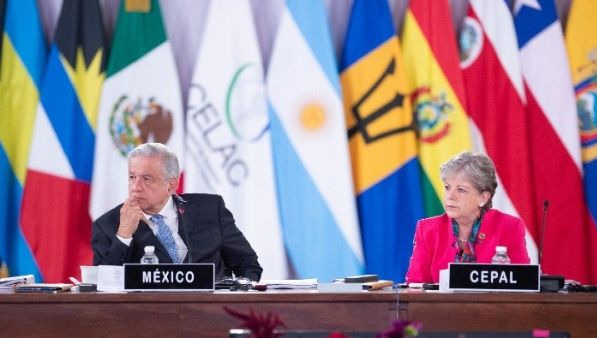
The executive secretary of ECLAC, Alicia Bárcena, called on the countries of the region to have political unity and will to face the COVID-19 sanitary emergency. | Photo: @cepal_onu
Mexico City, September 18 (RHC)-- The executive secretary of the Economic Commission for Latin America and the Caribbean (ECLAC), Alicia Bárcena presented this Saturday the technical report of her organization to the heads of State and Government participating in the Sixth Summit of the Community of Latin American and Caribbean States (CELAC).
Bárcena explained that, within the report, a Health Self-Sufficiency Plan was delivered to face the health emergency of Covid-19 and future pandemics, with the objective of guaranteeing universal access to vaccines in the short term.
"We have identified the actors and strategic institutions that can play a role in this at no cost to CELAC," said the diplomat, but insisted that political unity and the will to do so are necessary. The motivation of the plan is the unequal access to vaccination.
The document brings an observatory, an inventory of capacities and a very detailed analysis of the pharmaceutical industry, as well as elements to strengthen regulation and a roadmap in this regard.
"The main motivation of this plan is the unequal access to vaccination," said the ECLAC representative before mentioning countries such as Chile with a high percentage of vaccinated citizens and on the other hand Haiti, Guatemala and Nicaragua with low percentages.
"The pharmaceutical industry is a strategic sector for development", she added, while urging to promote this sector. Among the ideas in the plan are the creation of a virtual repository of clinical data with a regional platform for clinical trials, a transparent and regional mechanism for the purchase of vaccines and medicines, and a platform for subregional purchases.
In addition, Alicia Bárcena, on the issue of confronting the pandemic, called for creating consortiums, taking advantage of intellectual property flexibilities and fostering a stable regional market. "87 percent of drug imports come from outside the region," said the representative of the regional mechanism.
In this sense, she insisted on implementing immediate actions that Latin America must work on, such as the coordination of regulatory entities and the renewal of the Celac mandate to implement the plan.

